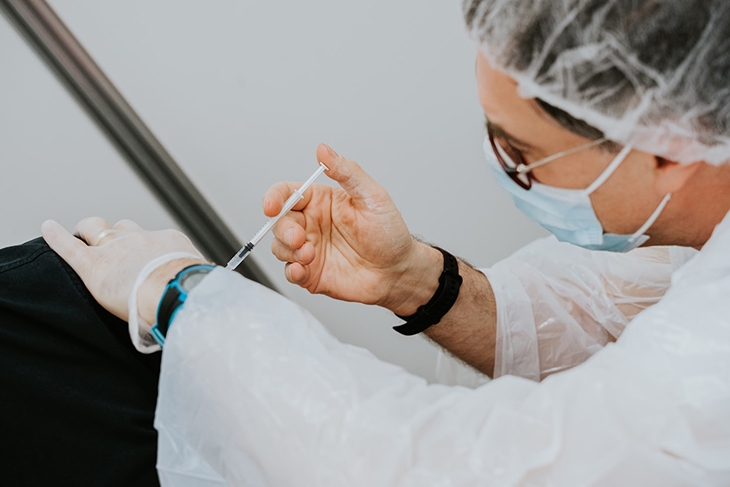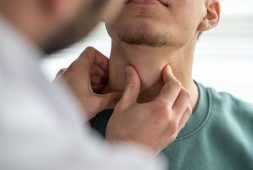
After nearly six years of research efforts, a major breakthrough has occurred in the fight against the respiratory syncytial virus (RSV). The U.S. Food and Drug Administration (FDA) has granted approval to the world’s first RSV vaccine, which was developed by the esteemed global biopharmaceutical company, GlaxoSmithKline (GSK).
This vaccine, known as Arexy, is designed to safeguard individuals aged 60 and older, making a critical milestone in RSV prevention.
Director of the FDA’s Center for Biologics Evaluation and Research, Peter Marks, MD, PhD, said in a statement, “Older adults, in particular those with underlying health conditions, such as heart or lung disease or weakened immune systems, are at high risk for severe disease caused by RSV.”
“Today’s approval of the first RSV vaccine is an important public health achievement to prevent a disease which can be life-threatening and reflects the FDA’s continued commitment to facilitating the development of safe and effective vaccines for use in the United States,” he added.
Meanwhile, GSK’s chief scientific officer Tony Wood said in an announcement, “Our focus now is to ensure eligible older adults in the U.S. can access the vaccine as quickly as possible and to progress regulatory review in other countries.”
GSK hopes that the vaccine will be available in the United States for older adults before the RSV season begins for 2023 to 2024, normally ahead of the winter months. RSV, which is both common but sadly fatal at times, has – until now – lacked an approved vaccine anywhere in the world.
According to the U.S. Centers for Disease Control and Prevention (CDC), RSV results in a substantial burden of illness, with an established annual toll of 60,000 to 160,000 hospitalizations and 6,000 to 10,000 deaths among adults aged 65 and above, primarily due to severe lung and respiratory tract infections.
Professor of global health and infectious diseases at Stanford University in California, Yvonne Maldonado, MDsaid, “RSV is quite a big cause of hospitalizations and deaths in those over 60, so this is a big deal. I think that short of the COVID vaccine, this is probably one of the biggest recent medical breakthroughs for older adults.”
In a significant development, GSK released data from a large-scale study involving approximately 25,000 adults aged 60 and above, demonstrating the vaccine’s effectiveness. Overall, Arexvy exhibited an impressive 82.6 percent efficacy in preventing lower respiratory tract illnesses linked to RSV, with an even higher rate of 94.1 percent in protecting against severe cases.
Notably, the vaccine proved highly effective, registering a 94.6 percent success rate in preventing severe illness among participants with preexisting medical conditions, such as cardiorespiratory issues and diabetes. In the age group of 70 to 79, the vaccine showed an efficacy of nearly 94 percent.
Further research, involving over 800 participants, highlighted the vaccine’s compatibility with flu shots. Administrated alongside a flu vaccine, GSK’s RSV vaccine demonstrated robust effectiveness.
“The seasonality of both RSV and influenza are overlapping; vaccine co-administration could allow higher flexibility in administration, supporting vaccine coverage, while helping to protect against both infections with reduced healthcare visits,” the authors wrote in the study, which was published December 15, 2022, in Open Forum Infectious Diseases.
Trial Findings Show That RSV Vaccine Is a Powerful Means of Prevention
Regarding safety, researchers reported that the RSV vaccine was well-tolerated and exhibited an acceptable safety profile. Adverse effects were generally mild and temporary, with common side effects including localized pain at the injection site, fatigue, muscle pain (myalgia), and headaches.
Nevertheless, an FDA briefing document did mention a single case of Guillain-Barré syndrome (GBS), potentially linked to the vaccination, occurring nine days post-vaccination. Guillain-Barré syndrome is a rare neurological disorder characterized by the immune system attacking peripheral nerves. Although the precise triggers for GBS are not fully understood, vaccines, in extremely rare cases, can activate the immune system, causing nerve cell damage. The CDC estimates that GBS occurs in one to two individuals per 100,000 annually, while GSK data showed an incidence of approximately 1 in 15,000 vaccines.
The FDA briefing also noted a single death among participants attributed to acute disseminated encephalomyelitis, an intense inflammation of the brain and spinal cord, possibly related to the vaccine. Consequently, GSK, the FDA, and the CDC will continue stringent safety monitoring as the vaccine becomes available to the public.
How Does the RSV Vaccine Work?
Efforts to develop an RSV vaccine have spanned several decades. Early trials in the 1960s utilizing an inactivated virus approach, similar to the flu vaccine, yielded unsuccessful results.
A significant breakthrough emerged in the journal Science in 2013 when researchers identified the pre-fusion F protein as a target for highly protective RSV vaccines. GSK’s vaccine includes pre-fusion RSV antigen along with an adjuvant, a substance designed to enhance vaccine efficacy.
“By injecting this stabilized protein in a vaccine, we are training the immune system to produce antibodies [protective immunity] against these proteins, thus making them unable to enter the cell to produce an infection,” explains Lalitha Parameswaran, MD, MPH, a clinical assistant professor of infectious diseases and a member of the vaccine center at NYU Langone Health in New York City.
The vaccine of GSK has pre-fusion RSV antigen along with an adjuvant, which is a drug created to enhance the efficacy of the vaccine.
Why Create the RSV Vaccine For the Elderly?
The need for an RSV vaccine for seniors is underscored by the heightened risk of severe disease due to age-related declines in immunity and underlying health conditions prevalent in this demographic, including asthma, chronic obstructive pulmonary disease (COPD), and congestive health failure, according to the CDC. Severe RSV infections can lead to bronchiolitis and pneumonia.
Notably, in the autumn of 2022, the United States experienced an early and severe surge of respiratory syncytial virus cases, straining hospitals and healthcare facilities. The transmission of RSV primarily occurs through respiratory droplets, which were less common due to COVID-19-related lockdowns and mask-wearing.
However, as these measures relaxed, viral infections surged, highlighting the importance of RSV prevention.
More RSV Vaccines On the Way For Both Adults and Children
GSK’s vaccine is the first among several RSV vaccines poised for potential approval. Pfizer has also developed an RSV vaccine for individuals aged 60 and above, called Abrysvo, which has gotten great recommendations from the FDA advisory group.
Data taken from 37,000 participants aged 60 and up showed that the research on the Pfizer RSV vaccine was ‘more than 66 percent effective at preventing illness overall, and efficacy rose to 85.7 percent in preventing severe disease.’
While the initial focus has been on older adults, efforts are underway to develop RSV vaccines for infants. The FDA is expected to make a decision regarding a Pfizer RSV vaccine for pregnant individuals, which can pass antibodies to their unborn babies, in August.
Statistics have shown that most children before the age of 2 get RSV, normally with just mild symptoms that tend to go away on their own. However, the CDC also noted that at least 1 to 2 children out of every 100 younger than 6 months of age with RSV infection could possibly need hospitalization. Unfortunately, those who are hospitalized sometimes require the use of oxygen, IV fluids – when they aren’t eating or drinking, or even mechanical ventilation to help with their breathing.
The Public Needs To Understand the Dangers of RSV
Despite these promising developments, more research is needed to assess the durability of protection and real-world efficacy of RSV vaccines as they reach the general public. Dr. Maldonado emphasizes the importance of ongoing research in this area.
She says, “I think people may have vaccine fatigue, but this is a real threat. I think we need to do a better job of communicating the risks of this disease — it is truly a serious illness.”



